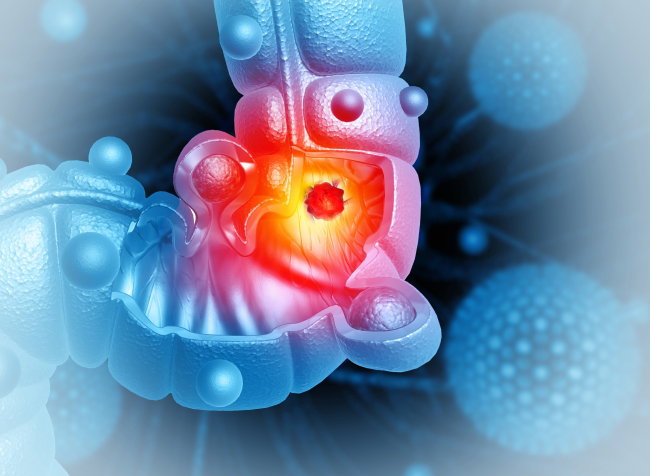Colorectal Cancer

Colorectal cancer develops in the colon or rectum and is one of the most common cancers worldwide. Early detection through screening is crucial for improving survival rates. Colorectal cancer often begins as non-cancerous polyps that can evolve into cancer over time. At Burjeel Cancer Institute, we offer comprehensive diagnostic services, advanced treatments including surgery, chemotherapy, radiation therapy, and targeted therapies, as well as personalized care plans tailored to each patient’s needs.
Symptoms and Risk Factors
- Blood in the stool or rectal bleeding
- Changes in bowel habits, including diarrhea or constipation
- Unexplained weight loss
- Abdominal pain or discomfort
- Fatigue or weakness
- A feeling of incomplete bowel evacuation
- Persistent cramps, gas, or bloating,

Risk Factors for bladder cancer
Age
Risk increases significantly after the age of 50
Family History
A family history of colorectal cancer or polyps increases the risk
Inherited Syndromes
Genetic conditions such as Lynch syndrome or familial adenomatous polyposis (FAP) can increase the risk
Diet
A diet high in red or processed meats and low in fiber may increase the risk
Lifestyle Factors
Smoking, heavy alcohol use, physical inactivity, and obesity are linked to a higher risk of colorectal cancer
Inflammatory Bowel Disease (IBD)
Conditions like Crohn’s disease or ulcerative colitis increase the risk of developing colorectal cancer.
Diagnostic Procedures
Common Symptoms of Colorectal Cancer include
Colonoscopy
The most effective screening tool, allowing the doctor to view the inside of the colon and remove any suspicious polyps for biopsy
CT Colonography (Virtual Colonoscopy)
A non-invasive imaging test that provides detailed pictures of the colon and rectum
Fecal Occult Blood Test (FOBT)
A lab test that checks stool samples for hidden blood, which may indicate cancer or polyps
Biopsy
During a colonoscopy, tissue samples are taken and analyzed to confirm the presence of cancer cells
PET-CT and MRI
Advanced imaging techniques used to detect and assess the spread of cancer
Genetic Testing
For patients with a family history or inherited genetic syndromes, testing for mutations in genes like APC, BRCA, or MLH1 is offered

Treatment Options
Targeted Therapy and Immunotherapy
- VEGF and EGFR Inhibitors: These targeted therapies block specific proteins that cancer cells need to grow, helping to slow or stop tumor growth.
- Immunotherapy (PD-1/PD-L1 Inhibitors): Boosts the body’s immune system to recognize and attack cancer cells, often used in cases with microsatellite instability-high (MSI-H) tumors.
Chemotherapy and Medical Oncology
- Adjuvant and Neoadjuvant Chemotherapy: Chemotherapy is given before surgery to shrink tumors or after surgery to eliminate any remaining cancer cells.
- Systemic Chemotherapy: Used for advanced or metastatic colorectal cancer, this treatment works throughout the body to destroy cancer cells.
Radiation Therapy
- External Beam Radiation Therapy (EBRT): Focused radiation beams are delivered to the cancerous area to shrink tumors or destroy cancer cells before or after surgery.
- Stereotactic Body Radiation Therapy (SBRT): Delivers high doses of radiation with precision, often used for tumors that have spread to other areas such as the liver.
Surgical Treatment
- Polypectomy: Removal of polyps during a colonoscopy for early-stage cancer or precancerous lesions.
- Colectomy: Partial or complete removal of the colon, often used in more advanced stages of colorectal cancer.
- Minimally Invasive Surgery (Laparoscopic Surgery): Minimally invasive techniques are used to remove cancerous sections of the colon, offering faster recovery and less pain.
- Colostomy: In some cases, a colostomy may be necessary to divert the bowel to an opening in the abdomen.
Multidisciplinary Approach
We use the most advanced diagnostic tools to detect and stage colorectal cancer accurately, including
- Colorectal Surgeons
- Medical Oncologists
- Radiation Oncologists
- Gastroenterologists
- Radiologists
- Pathologists
- Genetic Counselors
- Oncology Nurses
This multidisciplinary team works together to develop personalized treatment plans based on the stage and characteristics of the cancer.


Supportive Care and Patient Services
Colorectal cancer treatment requires a collaborative team of specialists, including
Nutrition Counseling
Tailored dietary advice to support digestion and manage side effects during treatment
Psychosocial Support
Counseling services for patients and families to cope with the emotional and psychological challenges of a colorectal cancer diagnosis
Palliative Care
Symptom management and quality-of-life support for patients with advanced or metastatic colorectal cancer
Physical Rehabilitation
Post-surgical rehabilitation programs to help patients regain strength and function after colorectal surgery.
Meet Our Experts
We provide a variety of supportive care services to help patients manage colorectal cancer treatment and maintain their quality of life
Patient Journey
We guide colorectal cancer patients through every step of their journey, from diagnosis to recovery.
Initial Consultation
A comprehensive evaluation with the colorectal cancer care team, including diagnostic imaging and tests to assess the cancer’s stage
Personalized Treatment Plan
Based on the patient’s diagnosis, we develop a customized treatment plan that may include surgery, chemotherapy, radiation, or other approaches
Treatment and Support
Patients undergo the recommended treatments, supported by our multidisciplinary team and supportive care services
Follow-Up Care
After treatment, patients receive regular follow-ups, including screenings and imaging, to monitor for recurrence and manage long-term health









